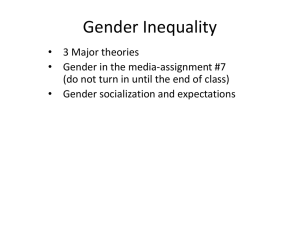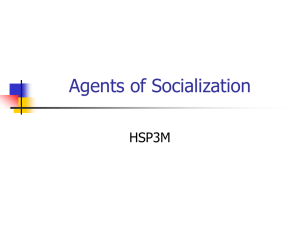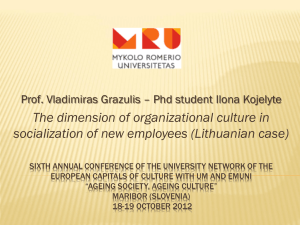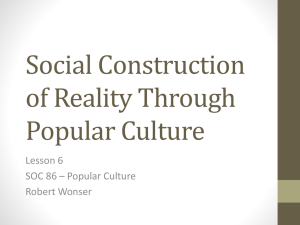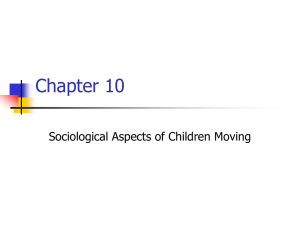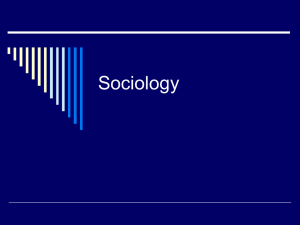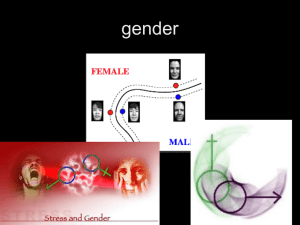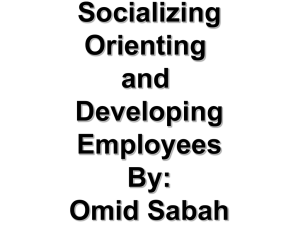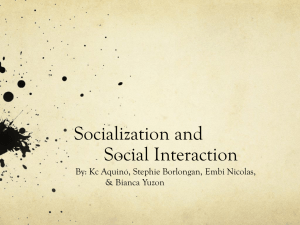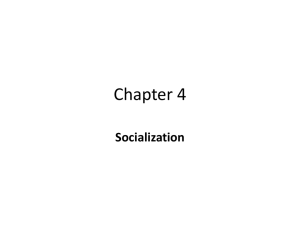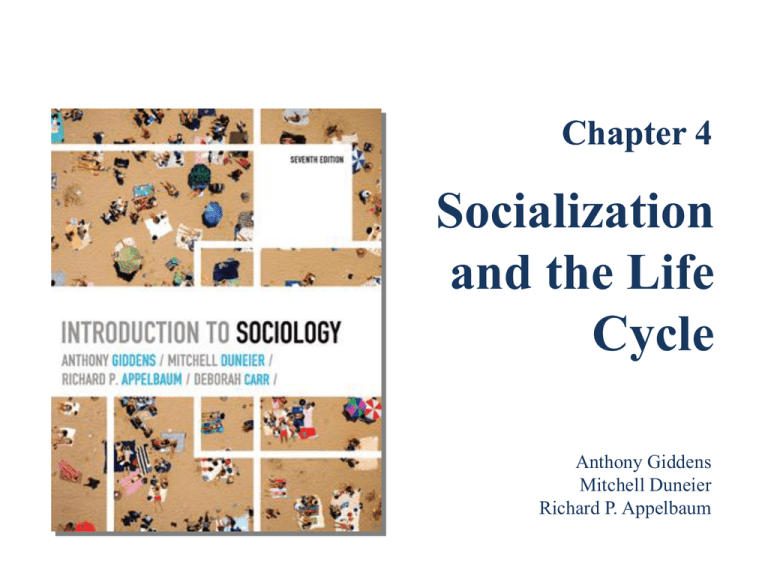
Chapter 4
Socialization
and the Life
Cycle
Anthony Giddens
Mitchell Duneier
Richard P. Appelbaum
Culture, Society, and Child
Socialization
What Is Socialization?
– Through contact with others, infants gradually
become self-aware, knowledgeable human
beings, skilled in the ways of a given culture
• Perpetuates values, norms, and social practices of
culture
• Connects generations to each other
Culture, Society, and Child
Socialization
“Unsocialized Children”
– Wild boy of Aveyron and Genie are examples
of unsocialized children
• Both retained “nonhuman” responses
• Neither displayed lasting viciousness
• Both acquired minimum level of human
capabilities
Theories of Child Development
G. H. Mead
– Children develop as social beings by imitating
actions of those around them
– Individuals develop self-consciousness by
learning to see themselves as others see
them
– Later, by entering into and learning rules of
play in organized games, children come to
understand the general values and moral
rules of culture
Theories of Child Development
Jean Piaget
– Emphasized child’s active capability to make
sense of the world
– Stages of development:
• Sensorimotor stage
Birth to age 2
Child learns by manipulating objects
Explores physical environment; understands it has
distinct and stable properties
Learns to distinguish people from objects
Theories of Child Development
Jean Piaget (cont)
• Preoperational stage
Age 2 to 7
Master language
Child is egocentric—unable to see the world from
another’s point of view
• Concrete operational stage
Age 7 to 11
Masters abstract, logical notions
Much less egocentric
Theories of Child Development
Jean Piaget (cont)
• Formal operational stage
Age 11 to 15
Able to grasp highly abstract and hypothetical ideas
Problem solve and understand trick questions
Achieving this stage depends partly on schooling
Not all adults reach this stage
Socialization through the Life
Course
What Are Agents of Socialization?
– Agents of socialization are structured groups
or contexts within which significant processes
of socialization occur:
•
•
•
•
•
Family
Schools
Peers
Mass Media
Work
Socialization through the Life
Course
The Family
– Principal socializing agent during infancy
– Family systems vary widely across cultures
– In modern societies, social position is not
inherited but the region and social class of
family affects patterns of socialization
Socialization through the Life
Course
Schools
– Children obey rules
– Must accept authority of teachers
– Reactions of teachers affect expectations
children have of themselves
– Peer groups often formed at school
Socialization through the Life
Course
Peer Relationships
– Peer groups are increasingly important
– Greatly influence gender socialization
– Have significant effect beyond childhood
Socialization through the Life
Course
Mass Media
– Can be both positive and negative
– Violence is promulgated on television
– Video games may deflect from school work or
other activities, become refuge from disliked
school environment
– But may also hone skills relevant to education
and wider participation in society that
depends on electronic communication
Socialization through the Life
Course
Work
– Important in all cultures
– Only in industrial societies are worklife and
homelife so separate
– Can pose unfamiliar demands, calling for
major adjustments in outlook or behavior
Socialization through the Life
Course
Social Roles and Identity
– Through socialization individuals learn about
social roles—socially defined expectations for
a person in a given social position
Socialization through the Life
Course
Social Roles and Identity (cont)
• This process leads to the development of a social
identity, the characteristics that other people
attribute to an individual
Social identity marks ways in which individuals are
the same as others
• Self-identity refers to the process of selfdevelopment through which we formulate a unique
sense of ourselves and our relationship to the
world
Self-identity sets us apart as distinct individuals
Socialization through the Life
Course
Gender Socialization
– Gender socialization begins as soon as an
infant is born
– Even parents who believe they treat children
equally tend to produce different responses to
boys and girls
– Differences are reinforced by many cultural
influences
Socialization through the Life
Course
The Debate about Gender Socialization
– Freud:
• Children learning about gender differences based
on the possession or absence of the penis
A boy feels threatened by his father and sees them
as a rival for his mother’s affection
Gives up love for mother because he fears castration
from father
A girl suffers from “penis envy”
Mother is devalued because she lacks a penis; girl
takes on submissive role
• Major objections have been raised about Freud’s
views
Socialization through the Life
Course
The Debate about Gender Socialization
– Chodorow:
• Learning to feel male or female derives from
infant’s attachment to parents at an early age
Emphasizes mother rather than the father
Girls remain closer to mother and develop sense of
self that is more contiguous with others
Boys have sharp break from mother and, as a result,
are unskilled in relating closely to others
Essentially reverses Freud’s emphasis
• Chodorow’s work has met with various criticisms,
though her work remains important
Socialization through the Life
Course
The Debate about Gender Socialization
– Gilligan
• Further developed Chodorow’s analysis,
concentrating on images adult women and men
have of themselves
Women define themselves in terms of personal
relationships and caring for others
Qualities developed by women are devalued by
men, whose focus is individual achievement
Socialization through the Life
Cycle
Socialization and the Life Course
– Socialization continues throughout the life
cycle
– At each phase of life there are transitions to
be made or crises to be overcome
– Five stages of the life course are:
•
•
•
•
•
Childhood
Teenager
Young adulthood
Mature adulthood
Old age
Socialization through the Life
Cycle
Socialization and the Life Course
– Stages of human life course are both
biological and social, influenced by cultural
differences and material circumstances
Socialization through the Life
Cycle
Socialization and the Life Course
– Life course has changed over time
• Concept of childhood and teenager didn’t exist
until recently
• Young adulthood is increasingly about personal
and sexual development
• Mature adulthood is more uncertain than in the
past; the midlife crisis is real for many people
• While elders were accorded great respect in
traditional societies, older people lack authority in
industrialized societies
Review Questions
1. From a sociological perspective, what is the
characteristic of human beings that most
distinguishes us from other animals?
a)
Human beings go through a process of socialization, which
begins in infancy.
b)
Human beings tend to pick mates for life, a practice that does
not exist among any other animals.
c)
Human beings are aware that they have a distinct identity that
is separate from others.
d)
Human beings have social roles, a concept that does not exist
in the animal kingdom.
Review Questions
2. Which of the following types of games
or playing is most likely to help children learn
the values and morality that govern social life?
a)
Two five-year-old friends like to pretend that one of them is the
mommy and the other the baby or child and they act out
different everyday scenes or activities.
b)
A group of eight- to ten-year-olds organize regular games of
capture the flag, taking turns being team captain and switching
team members around from game to game.
c)
A group of teenagers goes regularly to a skate park to practice
new moves and see what other skaters are trying out.
d)
Three-year-old twins want to help their parents cook dinner so
they are given wooden spoons and bowls filled with
“ingredients” to stir.
Review Questions
3. Which of the following statements is central to
Jean Piaget’s ideas about child development?
a)
Children select and interpret what they see, hear, and feel.
b)
Each stage of development is focused on overcoming a conflict.
c)
Development is considered a reaction to rewards, punishments,
stimuli, and reinforcement.
d)
Children passively absorb information from their surroundings.
Review Questions
4. A/An _________ can be defined as a set of
socially defined expectations for a person in a
given social position.
a)
social identity
b)
social role
c)
life course
d)
status set
Review Questions
5. How are social identity and self-identity
different?
a)
Self-identity is shaped more by individual agency and choice,
while social identity is subject to the influence of a person’s
social and cultural environment.
b)
Social identity is more likely to change over the course of one’s
life while self-identity is more likely to remain static.
c)
Social identity can be multi-faceted while self-identity tends to
develop around a single, dominant factor.
d)
A social identity emphasizes a person’s similarity to and
connection with others, while self-identity demonstrates that a
person is a distinct individual.
Review Questions
6. Who advanced the argument that male identity
is marked most strongly by a rejection of
closeness with the mother, which leads to
feeling threatened by close emotional
relationships later in life?
a)
Carol Gilligan
b)
June Statham
c)
Nancy Chodorow
d)
Lenore Weitzman
Review Questions
7. Which of the following life stages have
emerged largely in connection with the
development of modern societies?
a)
childhood
b)
adolescence
c)
mature adulthood
d)
Both A and B
e)
Both B and C
f)
Both A and C

